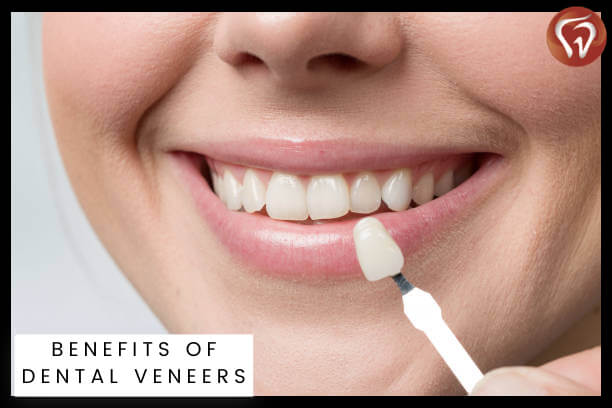Dental veneers, also known as porcelain veneers or dental laminates, are thin shells of porcelain that are bonded to the front surface of the teeth to improve their appearance. They are used to correct a variety of cosmetic dental issues such as teeth that are stained, chipped, misshapen, or slightly misaligned.
The process of getting veneers typically involves two appointments. During the first appointment, the dentist will examine the patient’s teeth to determine if veneers are the right option for their specific needs. If veneers are deemed appropriate, the dentist will then prepare the teeth by removing a small amount of enamel from their front surface. This is done to make room for the veneers and ensure a natural-looking fit.
Next, the dentist will take a digital scan of their teeth, which eliminates the mess of impressions. While the veneers are being fabricated, the patient will be given temporary veneers to wear. Once the permanent veneers are ready, the patient will return for a second appointment, during which the dentist will remove the temporary veneers and bond the permanent ones to the patient’s teeth. The dentist will then make any necessary adjustments and polish the veneers to ensure a natural and seamless look.
Veneers are a highly effective way to improve the appearance of teeth and can last for many years with proper care and maintenance. They can be maintained with regular dental cleanings and check-ups, good oral hygiene, and avoiding habits that can damage them such as biting nails and eating hard candy.
Dental veneers are a popular cosmetic dentistry option that can provide many benefits for individuals looking to improve the appearance of their teeth. Some of the main benefits of veneers include:
- Improved appearance: Veneers can be used to correct a variety of cosmetic dental issues such as teeth that are stained, chipped, misshapen, or slightly misaligned. They can also be used to close gaps between teeth, making them look straighter and more evenly spaced.
- Durability: Veneers are made of porcelain, which is a strong and durable material. They can last for many years with proper care and maintenance, making them a long-term solution for improving the appearance of teeth.
- Natural-looking: Veneers are custom-made to fit the patient’s teeth, ensuring a natural-looking fit. They are also translucent, which allows them to mimic the natural translucency of real teeth.
- Minimally Invasive: Veneers that are less invasive are called Lumineers which offers quick result but might not be an option for everyone.
The entire process of getting veneers typically takes only two appointments. This means that patients can achieve a new and improved smile in a relatively short period of time.
It’s important to note that while veneers can provide many benefits but may not be suitable for everyone. In some cases, other cosmetic treatments like teeth whitening or orthodontics may be more appropriate. A consultation with a dentist is necessary to determine if veneers are the right option for you.
Here are some tips for aftercare of dental veneers:
- Practice good oral hygiene: Brush and floss your teeth at least twice a day to maintain good oral health. This will help prevent plaque build-up, which can lead to tooth decay and gum disease.
- Avoid hard foods: Veneers are strong, but they can chip or break if used to chew hard foods such as ice or hard candy. Avoid these types of foods and instead, choose a diet that is easy on your teeth.
- Avoid biting nails: Biting nails can put a lot of pressure on your veneers, which can cause them to chip or break. Try to break the habit of biting nails if you have veneers.
- Avoid teeth grinding or clenching: Teeth grinding and clenching can put a lot of biting force on your veneers, which can cause them to crack or become loose. If you have a habit of grinding or clenching your teeth, talk to your dentist about getting a night guard.
- Regular dental check-ups: Regular dental check-ups and cleanings are important to maintain the overall health of your teeth and gums, including your veneers. Your dentist will be able to check for any potential issues and recommend suggestions.
By following these aftercare tips, you can help ensure that your veneers last for as long as possible and maintain their natural-looking appearance. Remember to always consult with your dentist if you have any questions or concerns about veneers. You can check “Signature Smilez” for more information.

